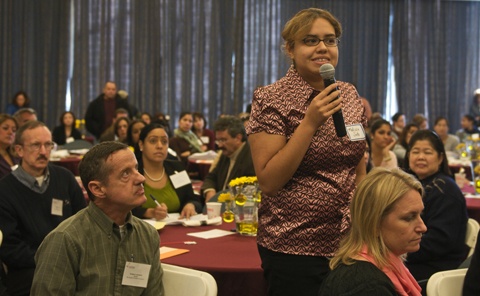Latino Policy Institute: Active Communities = Healthier PeoplePosted on 2009-09-20 13:08:02 by bethm
In November 2008 more than 150 representatives of Connecticut’s fast growing Latino community gathered in West Hartford for the Latino Health Summit to discuss access to health care. The event, hosted by the Hispanic Health Council’s Latino Policy Institute, marked a milestone in a journey that began more than 30 years earlier when a group of Puerto Rican leaders in Hartford formed the Hispanic Health Council to address critical health problems plaguing the Latino community. The Latino Policy Institute, created in 2006 with grants from the Universal Health Care Foundation of Connecticut and the Connecticut Health Foundation, looks for solutions to the problem of health disparities by addressing the deep-rooted inequities in the nation's health care and economic systems. Its first project was a report titled: "A Profile of Latino Health in Connecticut." Its authors discovered early on that comprehensive data about Latino health are hard to come by and what there is often does not take into account the cultural differences among Hispanics of different nationalities. Yet they were able to show that unskilled Latinos had little access to health care in Connecticut. Latinos make up the largest ethnic group and are among the state’s poorest, sickest and least-educated residents. Latino children have the highest incidence of asthma in Connecticut. Two out of three Latino adults are overweight or obese. Despite advances in treatment and early detection for breast and cervical cancers, Latina women are more likely than their non-Hispanic neighbors to die from the diseases. And although they comprise 11 percent of Connecticut’s population, Latinos account for 40 percent of those in the state with no health insurance. At the summit, Jeannette B. DeJesus, president and CEO of the Hispanic Health Council, found the absence of community outrage over the figures troubling. “These are the lives of our people.’’ The summit, she said, was a first step toward creating a network that will work to broaden health care access to improve the lives of Latinos in Connecticut and elsewhere. The summit was not a meeting, but a wake-up call, DeJesus said. For emphasis, she organized a rooster crowing contest among the participants. "I love roosters; they’re in my heart," DeJesus said, adding that they evoke memories of her roots in Puerto Rico. The rooster, she said, has become the Latino Policy Institute’s symbol and logo because it is a perfect metaphor for the urgency with which Latinos must approach the health care crisis facing their communities. "What we are saying is it is time to wake up," DeJesus said. "It's time to get on our feet." Read about the Latino Health Summit in The New York Times
Posted in
|
 back to Search Results
back to Search Results

